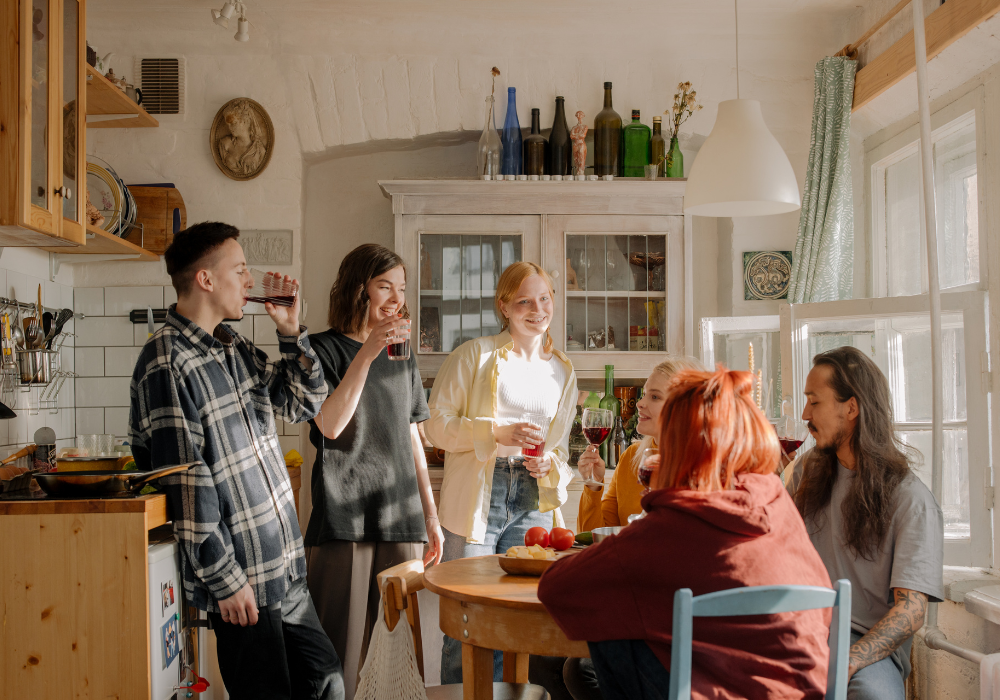Hosting dinner parties might be the mental health hack you never saw coming.

There’s something magical happening around kitchen tables and backyard patios again. Dinner parties—the real kind, with mismatched chairs, wine-stained conversations, and way too much dessert—are back. And they’re doing more than just feeding bellies. They’re feeding our minds.
After years of isolation, screen fatigue, and fast-paced everything, people are rediscovering that sitting down with friends for a meal might just be the most nourishing thing we can do for our brains. You don’t need a Pinterest-worthy setup or gourmet flair. What matters is the laughter, the eye contact, the stories told over second helpings.
These gatherings can rewire how we feel, think, and relate—not in some lofty theoretical way, but in tangible, beautiful shifts you’ll feel for days. Here’s how dinner parties are quietly healing us from the inside out.
1. Dinner parties give your brain the social stimulation it craves.

Your brain is wired for connection, and nothing fires it up like real, face-to-face socializing. When you host or attend a dinner party, you’re engaging in dynamic conversations, facial recognition, voice tone processing, and emotional reading—all things that keep your neural pathways sharp.
Unlike texting or social media, this kind of interaction is spontaneous and unpredictable, which is excellent for mental flexibility. Plus, the emotional bonding that happens over shared stories and laughter boosts oxytocin levels, making you feel more grounded and emotionally secure. It’s like your brain gets a workout and a hug at the same time.
And over time, these connections can act as a buffer against depression, anxiety, and even cognitive decline. Think of it as a workout for your emotional intelligence—with dessert on the side.
2. Hosting people makes you feel needed—and that’s powerful.

Let’s be real: feeling useful matters. When you open your home to others, even if it’s just for pizza and wine, you’re stepping into a role that gives you purpose. You’re offering a safe space, nourishment, and care.
Giving in this way creates a sense of value and belonging that can lift your spirits and remind you that you’re important to other people’s lives. Psychologists say having a sense of purpose is a major protective factor for mental health—and hosting dinner parties delivers that in spades.
It pulls you out of your own head and focuses your energy on creating joy for others. The glow you get after everyone leaves isn’t just pride in your cooking—it’s a deep, satisfying reminder that you still matter.
3. Conversations at the table force your brain to slow down and focus.

At dinner parties, you’re not multitasking on your phone or half-watching TV. You’re engaged, listening, asking follow-ups, and actually digesting what people say. That’s rare in today’s distracted world.
This kind of focused, in-the-moment communication gives your brain a break from constant stimulus-switching. It encourages deeper thinking, active memory recall, and real empathy. When you’re telling a story or responding to someone else’s, your mind is practicing narrative skills, emotional processing, and social reasoning.
Basically, dinner table chats are like yoga for your brain—stretching it in ways that modern life often doesn’t. And the more you do it, the more skilled your brain becomes at attention, patience, and curiosity. It’s mental training disguised as casual conversation.
4. Preparing for guests gives you a structured creative outlet.

From planning the menu to arranging chairs, prepping for a dinner party activates your creative brain in the best way. It’s not high-pressure like work deadlines, but it still gives you something to design, organize, and bring to life.
That kind of low-stakes creativity has major mental health perks. It boosts dopamine and gives you a sense of accomplishment. Even choosing a playlist or deciding on candle placement becomes a fun little exercise in self-expression.
The structure of having people over gives you motivation, but the freedom to do it your way keeps it light. It’s a chance to create an experience—not just a meal—and that’s deeply satisfying for your psyche.
5. Laughing over a meal literally changes your brain chemistry.

There’s no substitute for belly-laughing with people you care about, and dinner parties are one of the most natural places for that to happen. When you laugh, your brain releases endorphins—feel-good chemicals that reduce stress, improve mood, and even relieve pain.
Laughter also lowers cortisol, the hormone responsible for that frazzled, overwhelmed feeling. And let’s not forget how contagious laughter is. When it starts bouncing around the table, everyone feels more connected and at ease.
Over time, these moments create positive mental associations with socializing, which encourages you to do it more often. So yes, your mind actually functions better after a night of cracking up with friends over second helpings of pie.
6. Breaking bread together deepens emotional bonds.

There’s a reason cultures around the world place so much emphasis on shared meals. Eating together creates intimacy. There’s something about passing dishes, clinking glasses, and lingering over dessert that builds trust and vulnerability. Your brain registers that closeness.
It releases oxytocin—the bonding hormone—which strengthens your connections and leaves you feeling emotionally supported. These gatherings reinforce the message: you’re not alone. That’s powerful in a world where loneliness has become a public health crisis.
Even occasional dinner parties can foster the kind of social glue that helps you feel anchored and emotionally resilient. It’s therapy, only tastier and with wine refills.
7. Talking about real things reduces emotional suppression.

We often bottle up our emotions in daily life, but something about a dinner party lets the guard down. Maybe it’s the relaxed setting, the wine, or the warm lighting—but suddenly, real conversations happen.
You end up sharing frustrations, dreams, or even confessions. And when you express those feelings, your brain processes and releases them instead of storing them like ticking time bombs. That’s huge for your emotional health.
Suppressed emotions are linked to anxiety, sleep problems, and even chronic illness. So those late-night heart-to-hearts over coffee? They’re more than comforting—they’re healing.
8. Trying new foods sparks joy and curiosity.

Dinner parties often push you to try dishes you wouldn’t make on your own. Whether you’re tasting someone’s homemade curry or attempting a new recipe, this variety gives your brain something fresh to chew on—literally and figuratively.
Novelty stimulates dopamine, the pleasure and motivation chemical. It also wakes up your senses, especially taste and smell, which are deeply tied to memory and emotion. These little sensory surprises can create strong positive mental associations and lift your mood.
Plus, food becomes a conversation starter, a bridge between cultures, and a chance to feel adventurous—all without leaving your dining room.
9. Cleaning up gives you an unexpected mindfulness boost.

Weirdly enough, even the post-party mess can be good for your mind. Washing dishes, putting things away, and wiping down counters offers a quiet, repetitive rhythm that’s oddly calming.
It pulls you into the moment and gives your brain a break from overthinking. This kind of physical routine acts like a meditative reset, especially after all the social interaction. It’s your way of mentally closing the evening while your body does something useful.
There’s a bonus sense of pride in seeing your space restored, like a satisfying conclusion to the story you just hosted.
10. Seeing your home as a gathering space boosts your self-image.

When you use your home to bring people together, it stops being just a place to crash. It becomes a space of generosity, warmth, and connection—and that shift changes how you see yourself. You start viewing your life as something that adds value to others.
That mental reframing can seriously boost your self-esteem and sense of identity. Instead of focusing on flaws or what your house lacks, you begin to focus on what it offers.
And that mindset trickles into how you approach relationships, community, and even your own worth. Your home becomes a symbol of something beautiful—and so do you.
11. Repeating this ritual builds long-term emotional resilience.

The more often you gather people around your table, the more your brain learns to associate social interaction with safety, reward, and fulfillment. That’s no small thing. It helps rewire pathways shaped by stress, isolation, or self-doubt.
Over time, this creates a kind of emotional muscle memory—your own personal resilience bank. You’ll find it easier to reach out when you’re struggling, and you’ll bounce back faster from hard times.
And that’s the hidden magic of dinner parties: they don’t just bring joy for an evening. They build the emotional scaffolding that helps you stay strong for the long haul. And you can’t get that from takeout.
